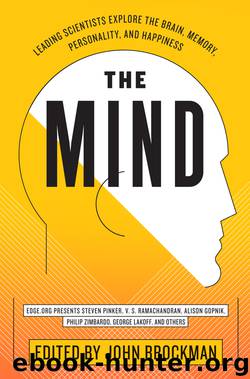The Mind by John Brockman

Author:John Brockman
Language: eng
Format: epub
Publisher: HarperCollins
Published: 2011-07-31T16:00:00+00:00
9
You Can’t Be a Sweet Cucumber in a Vinegar Barrel
Philip Zimbardo
Psychologist, Stanford University; Author, The Lucifer Effect: Understanding How Good People Turn Evil
For years I’ve been interested in a fundamental question concerning what I call the psychology of evil: Why is it that good people do evil deeds? I’ve been interested in that question since I was a little kid. Growing up in the ghetto in the South Bronx, I had lots of friends who I thought were good kids, but for one reason or another they ended up in serious trouble. They went to jail, they took drugs, or they did terrible things to other people. My whole upbringing was focused on trying to understand what could have made them go wrong.
When you grow up in a privileged environment you want to take credit for the success you see all around, so you become a dispositionalist. You look for character, genes, or family legacy to explain things, because you want to say your father did good things, you did good things, and your kid will do good things. Curiously, if you grow up poor you tend to emphasize external situational factors when trying to understand unusual behavior. When you look around and you see that your father’s not working, and you have friends who are selling drugs or their sisters are in prostitution, you don’t want to say it’s because there’s something inside them that makes them do it, because then there’s a sense in which it’s in your line. Psychologists and social scientists who focus on situations more often than not come from relatively poor, immigrant backgrounds. That’s where I came from.
Over the years I’ve asked that question in more and more refined ways. I began to investigate what specific kinds of situational variables or processes could make someone step across that line between good and evil. We all like to think that the line is impermeable—that people who do terrible things like commit murder, treason, or kidnapping are on the other side of the line—and we could never get over there. We want to believe that we’re with the good people. My work began by saying no, that line is permeable. The reason some people are on the good side of the line is that they’ve never really been tested. They’ve never really been put in unusual circumstances where they were tempted or seduced across that line. My research over the last thirty years has created situations in the laboratory or in field settings in which we take good, normal, average, healthy people—more often than not healthy college students—and expose them to these kinds of settings.
For example, think of William Golding’s Lord of the Flies, in which the key variable in transforming Jack Merridew, a good choirboy, into a kid who could not only kill pigs but also then kill Piggy the intellectual is that he changes appearance. He gets naked, uses berries to mask himself, and makes other kids do the same. Then they do something that has been prohibited; namely, they kill pigs they need for food.
Download
This site does not store any files on its server. We only index and link to content provided by other sites. Please contact the content providers to delete copyright contents if any and email us, we'll remove relevant links or contents immediately.
Whiskies Galore by Ian Buxton(40619)
Introduction to Aircraft Design (Cambridge Aerospace Series) by John P. Fielding(32366)
Small Unmanned Fixed-wing Aircraft Design by Andrew J. Keane Andras Sobester James P. Scanlan & András Sóbester & James P. Scanlan(32154)
Craft Beer for the Homebrewer by Michael Agnew(17471)
Turbulence by E. J. Noyes(7078)
The Complete Stick Figure Physics Tutorials by Allen Sarah(6657)
Kaplan MCAT General Chemistry Review by Kaplan(6082)
The Thirst by Nesbo Jo(5813)
Bad Blood by John Carreyrou(5798)
Learning SQL by Alan Beaulieu(5444)
Weapons of Math Destruction by Cathy O'Neil(5067)
Man-made Catastrophes and Risk Information Concealment by Dmitry Chernov & Didier Sornette(4769)
iGen by Jean M. Twenge(4713)
Digital Minimalism by Cal Newport;(4605)
Life 3.0: Being Human in the Age of Artificial Intelligence by Tegmark Max(4534)
Audition by Ryu Murakami(4122)
Electronic Devices & Circuits by Jacob Millman & Christos C. Halkias(4061)
1,001 ASVAB Practice Questions For Dummies by Powers Rod(4055)
Pale Blue Dot by Carl Sagan(4031)
